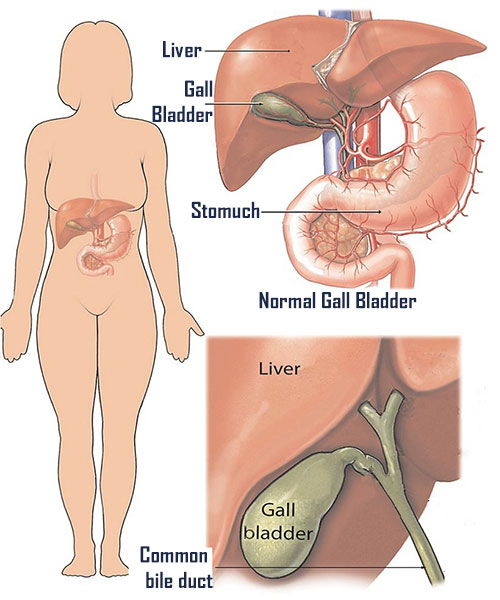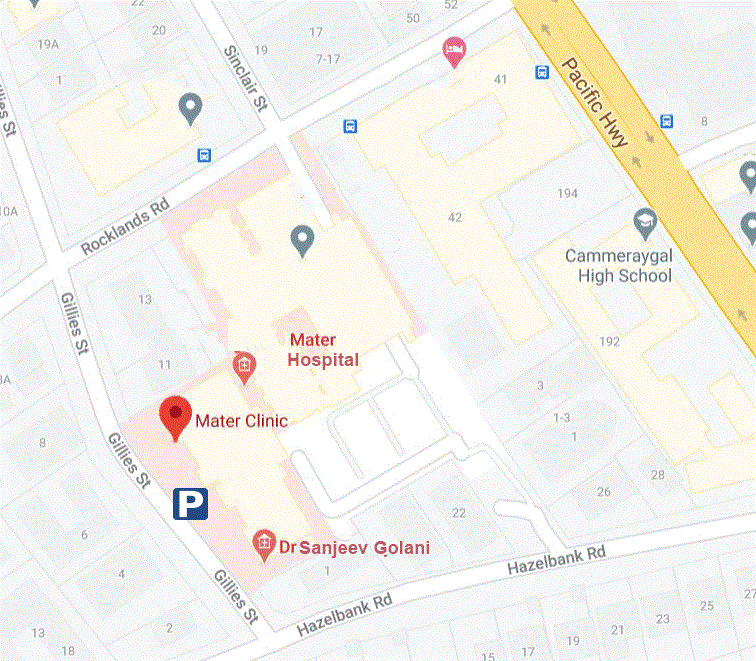Gall Bladder Surgery
Cholecystectomy (Gall Bladder Removal)
The gallbladder is a small sac that holds bile, a digestive juice produced by the liver that is used in the breakdown of dietary fats. The gallbladder extracts water from its store of bile until the liquid becomes highly concentrated. The presence of fatty foods triggers the gallbladder to squeeze its bile concentrate into the small intestine.
Gallstones (biliary calculi) are small stones made from cholesterol, bile pigment and calcium salts, usually in a mixture that forms in the gallbladder. They are a common disorder of the digestive system, and affects around 15% of people aged 45 years and over. However this is increasingly a modern disease, where younger patients are being diagnosed and treated.Read more about Gallstones here.
Some things that may cause gallstones to form include the crystallisation of excess cholesterol in bile and the failure of the gallbladder to empty completely.
A cholecystectomy is surgery to remove the gallbladder.

Why is the procedure performed?
Sometimes the gallbladder becomes blocked with gallstones that form from within the bile and can cause pain, bloating, nausea and vomiting. Other complications can also occur, including inflammation of the gallbladder, inflammation of the pancreas, jaundice and infection.
In these cases, a cholecystectomy is performed under general anaesthetic to remove the gallbladder. Sometimes, gallstones can move into your common bile duct. Bile ducts are 'pipes' that carry bile from the liver to the gallbladder and from the gallbladder to the small intestine.
Understanding the Costs of Gall Bladder Surgery
We understand that the idea of surgery and its associated costs can be overwhelming. To get a better understanding of potential costs, you can review information about hospital and insurance options here. Please note that an initial consultation is necessary to confirm your diagnosis. Once your diagnosis is confirmed, we can provide a more detailed cost estimate for your surgery.
Your Consultation
Dr. Golani will provide further discussion regarding the specifics of your diagnosis during your consultation. Additionally, you'll have the opportunity to select the hospital for your procedure and potentially set the date for your procedure.
The best surgical hospitals in Sydney are available for your surgery:
- Sydney Adventist Hospital, Wahroonga
- The Mater Hospital, North Sydney
- Norwest Private Hospital, Bella Vista
- Hornsby Ku-ring-gai Hospital, Hornsby
What happens during the procedure?
Dr Golani has performed many cholecystectomies (gall bladder operations) over his career. He specialises in Laparoscopic (keyhole) surgery. This is a minimally invasive approach which has an advantage over open surgery as it only requires small incisions in the abdomen versus the large single incision of open surgery. Most patients will experience less pain, a quicker recovery and a shorter hospital stay with laparoscopic surgery.
Dr Golani will make 4 small cuts (incisions) in your abdomen so they can introduce a piece of equipment known as a laparoscopic telescope through one of the incisions. This will allow them to see inside your abdomen.
Then metal tubes will pass through the other incisions. Dr Golani will put carbon dioxide inside you to lift the wall of the abdomen away from the organs. At the end of the operation, titanium clips will be used to close off the ducts and arteries leading to the gallbladder and remove the gallbladder with instruments inserted through the tubes.
After the gallbladder has been removed, the carbon dioxide is allowed to escape before the incisions are stitched. The clips will stay inside you.
If your gallbladder is very inflamed you may need 'open cholecystectomy', which requires a larger cut in your upper abdomen.
What to expect after the procedure?
You will be monitored in recovery for some time and will normally be able to go home within 24 hours. You may have some side effects from the general anaesthetic such as a headache, nausea or vomiting, which can be controlled with medicine.
You will have some pain in your abdomen after the operation, which can be controlled using pain relief. You may also have some pain in your shoulder from the gas used in the operation, which can be eased with walking.
You will have a drip in your arm at first, which will be removed after the anaesthetic wears off. You can take sips of water at first then slowly get back to eating and drinking normally.
Important Points to Remember:- No driving for 5 days post-discharge from hospital
- Your dressings are waterproof so you can shower as normal
- Do not sit/soak in a bath for 10 days
- Leave your dressings in place for 7 days
- Use regular fibre supplement such a Metamucil will help avoid constipation
- Walking unrestricted is allowed post discharge
- Cycling/running/swimming is allowed 2 weeks post discharge
- Lifting weights may cause complications for your surgery. Limit lifting anything heavier than 8kgs for 4 weeks post-surgery. Additionally, you should not lift anything heavier than 15kgs for a further 4 weeks post-surgery
- No special diet post-surgery is required to be followed
- Make an appointment to see Dr Golani 4 weeks post-surgery
To schedule a consultation with Dr. Golani, please contact our team for a consultation with Dr Golani. We have appointments available at three convenient locations across Sydney:

Please note that a GP referral will be required prior to your consultation.
Contact Us
To make an initial consultation booking, please contact our office on 02 8599 9819.
Click here to email usHornsby Clinic Address:
Madison BuildingSuite 7, 25-29 Hunter St,
Hornsby NSW 2077
Phone: (02) 8599 9819
Email: info@drgolani.com.au
Fax:(02) 9012 0976
HealthLink: drgolani

Our Horsnby clinic is located conviniently next to Hornsby Westfield & Hornsby Station
Click here for MAP LOCATION
Mater Clinic Address:
Suite 13, Level 1 Mater ClinicMater Hospital
25 Rocklands Rd, North Sydney NSW 2060
Phone: (02) 8599 9819
Email: info@drgolani.com.au
Fax:(02) 9012 0976
HealthLink: drgolani

Our Mater clinic is located within Mater Hospital. Parking and Entry (convenient Pickup and Drop Zone) is via 5 Gillies St, Wollstonecraft.
Click here for MAP LOCATION
Norwest Clinic Address:
Suite 301C, Level 3Q Central Building
10 Norbrik Dr, Bella Vista NSW 2153
Phone: (02) 8599 9819
Email: info@drgolani.com.au
Fax:(02) 9012 0976
HealthLink: drgolani

Our Norwest - Bella Vista clinic is located within Q Central Building - opposite Norwest Private Hospital. Free Limited Parking is available within the Q Central Building. There is a drop off zone outside of the building. Paid parking is available opposite at Norwest Private Hospital. Additionally there is parking at Woolworths Norwest Circa (5 minutes walk from the Clinic)
Click here for MAP LOCATION
What do I bring to my appointment?
- Referral letter
- X-Rays/Scans
- Test results relating to referral
- Health fund card
- Medicare card
Procedures
Dr. Golani offers an extensive range of General and Colorectal Surgical procedures, expertly addressing a diverse array of symptoms, conditions, and diseases. His patient-focused approach ensures personalised care tailored to individual needs.
Bowel Cancer
Dr. Golani delivers exceptional outcomes in laparoscopic resections for both bowel and rectal cancers, combining expertise with advanced surgical techniques to ensure the highest standard of care.
Hernia Surgery
Dr. Golani specialises in hernia repair surgeries, expertly treating ventral hernias as well as performing advanced laparoscopic procedures for inguinal, femoral, and umbilical hernias. His expertise ensures precise and effective care.
Gall Bladder Surgery
Dr. Golani specialises in minimally invasive gall bladder surgery, ensuring faster recovery times and shorter hospital stays with advanced surgical techniques.
Colonoscopy
Dr. Golani is certified by GESA in advanced endoscopic techniques, enabling him to expertly perform colonoscopies and remove large polyps with precision and care.
Rectal Prolapse Surgery
Dr. Golani is an expert in Laparoscopic Ventral Mesh Rectopexy, a highly effective and minimally invasive procedure for rectal prolapse. His advanced skills ensure precise care and improved outcomes for his patients.
Anal Fistulas & Fissures
Dr. Golani offers expert care in managing painful anal fistulas and fissures, providing effective treatments tailored to relieve discomfort and improve quality of life.
Haemorrhoids
Dr. Golani is highly skilled in both traditional and advanced surgical techniques for treating haemorrhoids, offering effective solutions tailored to each patientís needs.
Gastroscopy & Endoscopy
Dr. Golani is accredited by the Gastroenterological Society of Australia (GESA), ensuring advanced expertise and high standards in performing gastroscopy and endoscopy procedures.
